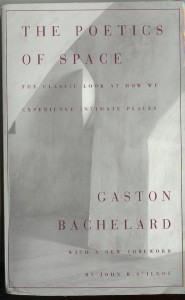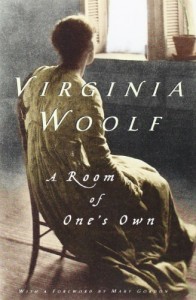by Colorado Review Editorial Assistant Christa Shively
I am sitting on my couch, in my living room, in a place that I have staked, flagged, and signed on the dotted line for. My neighborhood is made up of parcels of earth, homogenized snippets of ground, dovetail lots containing homes, yards, and mailboxes. Each driveway has identical SUVs, and scattered by front doors are tipped-over tricycles. I participate in this strange idea of ownership. As if the weather pushing its overbearing body against my house should know that it is unwelcome. That wind is for the birds, but not the ones within the boundaries of what the bank says will be mine in just twenty-nine more years. I struggle and possibly digress with this notion, but the perimeter is there and I am within it, so I think about Virginia Woolf and Gaston Bachelard and I find myself feeling grateful for the advantage. With impending deadlines, new opportunities, and constant overwhelm, I find myself in a place of personal reflection, gratefulness, and creative liberty.
 It is 4:43 a.m. on a Sunday. I got off work from my bartending job about an hour ago. My house, or rather, as Bachelard would say, my “corner of the world,” is quiet, for now. In less than three hours my two-year-old daughter will be running through the house, hiding in kitchen cabinets, riding her bike in the basement, giggling, screaming, and rummaging through the pantry like a little bear. Her awakening will be followed more slowly and less energetically by my eight-year-old daughter, who will stretch, yawn, mumble sleepily, and help my husband make breakfast because Sundays are my day to sleep in. I want to delve into the moments among my family, graduate school, and work. The rare, quiet moments that are siphoned from sleep time in order to provide the essential lifeblood to creative work. Moments spent in a time/place that I now relate to home.
It is 4:43 a.m. on a Sunday. I got off work from my bartending job about an hour ago. My house, or rather, as Bachelard would say, my “corner of the world,” is quiet, for now. In less than three hours my two-year-old daughter will be running through the house, hiding in kitchen cabinets, riding her bike in the basement, giggling, screaming, and rummaging through the pantry like a little bear. Her awakening will be followed more slowly and less energetically by my eight-year-old daughter, who will stretch, yawn, mumble sleepily, and help my husband make breakfast because Sundays are my day to sleep in. I want to delve into the moments among my family, graduate school, and work. The rare, quiet moments that are siphoned from sleep time in order to provide the essential lifeblood to creative work. Moments spent in a time/place that I now relate to home.
What is the one thing I wish I had on a daily basis? More time. More hours in a day, days in a week, months in a year. This is a greatly explored and completely unoriginal idea—I think most everyone wishes for more time. It is in this commonness that I find some relief, some empathy with my peers. My life is exhausting and full, and I am grateful. The challenge is where to carve out moments to devote to my writing practice—to creation and, of course, revision, revision, revision. I have found that the earliest hours of the morning, after I have stepped away from the chaos of work and into the interim before my children are awake, is that time. Yes, that means a worthwhile sacrifice of rest. Formulating words to expel the day before entering sleep is above all completely necessary. While we are all different in our routines and rituals, I have found that these moments spent in the center of my home, in the middle of the night, are the most conducive to writing at this stage in my life.
To say that a space is necessary for writing would be true, but a space can only hold so much of the weight of a writing practice. There must also be allocated time—a time so entirely enmeshed in the everyday routine that to bypass it would be unthinkable. Not like guilt over skipping the gym, but rather the pain of skipping sleep or food. These convictions are inspired by both Bachelard and Woolf. I recognize the privilege of owning the home in which my children will grow up. I understand the relief of knowing where I will be living for more than a year at a time. I feel fortunate to be able to sustain my family with a part-time job that allows me the time to go to school, be home, and to write. Woolf admits that, to survive as a woman writer in her time, she must have an income and a room of her own in which to write. Those things are still very much a need today, but are more attainable now for all women aspiring to be writers.